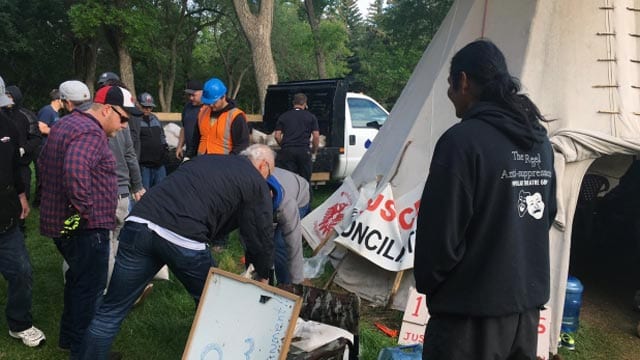
The Saskatchewan government is asking a judge to order an Indigenous protest camp to leave the legislature grounds.
Government lawyer Michael Morris has told a Regina court that the protesters are making it hard for the province to maintain the land across from the building.
Teepees have been set up for six months as campers protest what they say is racial injustice and the disproportionate number of Indigenous children apprehended by child-welfare workers.
Protesters have filed a court application of their own seeking to have six arrests made during an eviction in June declared illegal.
Lawyer Dan LeBlanc, who represents the protesters, told court his clients have a right to free speech.
But Morris says it’s not about whether the protesters are advocating for a good cause but rather about them following the law, including bylaws that ban open fires and structures such as teepees on the property.
“This case is not about whether the protesters are advocating for an honourable cause,” Morris told court Thursday. “It is not about whether there are too many Indigenous children in foster care. It is not about whether the criminal justice system is fair for Indigenous people.
“This case is about the government’s ability to regulate, maintain land in Wascana Centre.”
Protesters first set up a camp on Feb. 28 and were immediately told they had to leave, Morris said. They were given numerous trespassing notices and police moved in June 18 to dismantle the camp. Six people were arrested but never charged.
The camp was set up again two days later and police have held off ever since. The government wants a judge to order police to intervene.
Nine events have had to be relocated because of the camp, including part of the province’s Canada Day celebration.
The camp has been a “potential flashpoint for confrontations between members of the public and the protesters,” added Morris, who pointed to the recent arrest of a man who allegedly discharged fireworks at the camp.
LeBlanc told court Regina police Chief Evan Bray has already concluded the camp does not pose a safety risk. This case is about freedom of speech which is fundamental to a democracy, he said.
“They are using a fundamental Canadian freedom,” he said. “The government bears the burden of convincing you that its infringement is justified.”
People are allowed to use fires to barbecue hot dogs on the property but the government is taking issue with a sacred fire, he added.
“The government is seeking to control and administer the park,” LeBlanc said. “The concern is primarily aesthetic.”
Eric Adams, a constitutional law expert at the University of Alberta, has said the province would likely have to show legitimate safety concerns to persuade the court.
In cases such as this one, he said the court will want to protect political expression as much as possible.
“(But) even though you have a right to that expressive activity, a court is going to find that at some point, pretty early in the process, the government can limit that expressive right for a number of other valuable policy reasons,” Adams said.










